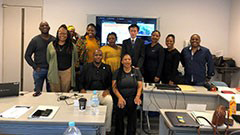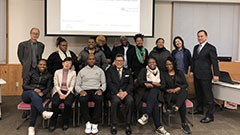- Home
- Our Work
- Types of Assistance
- Technical Cooperation
- Distance Technical Cooperation - JICA-Net
- JICA-Net multimedia-based learning materials Sample Activities
- JICA Governance and Peacebuilding Department; Utilizing the material in JICA Knowledge Co-Creation Programs - Public finance management learned from Japan's examples -
JICA Governance and Peacebuilding Department
Utilizing the material in JICA Knowledge Co-Creation Programs - Public finance management learned from Japan's examples -
Produced as a pre-learning material for the training program
JICA Country focused training course "Public Finance for Development" conducted for the Republic of South Africa has been sharing the knowledge of how Japanese central and local governments properly manage their finance in order to facilitate the improvement of impact from implementation of the urban development projects with the ministries and public entities in metropolitan areas that are responsible for local administration.
We produced JICA-Net multimedia-based learning material, "Public Finance Management for Development" (YouTube, external link), in order for central and local government officials who are in charge of public execution of finance management and planning of urban development in developing countries to study the outline of the said program by themselves online, or to use it at introduction programs of trainings in similar sectors.
The purpose of the material is to be utilized by lecturers and trainees to facilitate their understanding on how the impacts from execution of development projects and management of revenue and expenditure is relevant.
Utilize the lessons given from Japan's examples as hints for problem-solving
 The downtown Minato Mirai 21 district, in particular, has gained attention as a successful example of urban development.
The downtown Minato Mirai 21 district, in particular, has gained attention as a successful example of urban development.
We released this material in JICA Country-focused training for the Republic of South Africa, held from November, 2nd to 17th, 2022. 10 participants from metropolitan areas and the Ministry of Finance of South Africa took part in the training program in which we showed the material as an introduction of the training program.
The material starts by explaining Japan's natural environment, society, economy, and current situation and issues of administration as basic information for understanding the examples of urban and community development deeply. Next, it introduces 3 types of projects: Minato Mirai 21 as a Large-scale urban development project, an advanced project through open innovation handled by Yokohama city and local development project "OGAL "in Shiwa Town through Public Private Partnership.
The characteristics of this material are the following 4 points.
(1) Cross-cutting issues of local government finance, which Japan currently faces and developing countries would face in the future, (2) The views from both finance and project implementations, (3) Including many interviews with those who are actually involved in the projects, (4) High-interested themes (ex. community participation, public-private partnership), which are not depends on the scale of the municipality.
 With the lecturers of Minato Mirai 21 example
With the lecturers of Minato Mirai 21 example
The participants from the Republic of South Africa were able to grasp the concrete images of each of the cases since they had online learning in advance to site visits to the places introduced in the material during the training program in Japan. It enabled to get the impact as the they actively participated the discussions in the lecture and site visits.
Material has been produced triggered by feedback from the ex-participant of the training.
 With the lecturers of OGAL Shiwa example.
With the lecturers of OGAL Shiwa example.
The material was made because of the inspiration of an ex-participant of JICA country-focused training that had been conducted from FY 2016 prior to the present program.
One of the major problems often recognized in developing countries, "Lack of the consistency and executive ability of a policy" has been tackled by the Republic of South Africa, as well. The inconsistency between mid and long-term policy planning and implementation has long been a problem in central and local government in the country.
In this circumstance, the efforts of the projects, such as "Minato Mirai 21" and "OGAL Shiwa" implemented by municipalities caught the high interest of many participants of the trainings who consider these as achieved examples which shows the result of the efforts in these projects. Participants also demonstrate their interest in introducing these study cases to their colleagues after returning to their countries.
In the process of the making development policies and formulating the public investment projects and maintaining facilities for maximizing the population's public welfare, the maintenance of fiscal discipline, the efficient distribution of fiscal resources, and the efficient and effective utilization of the funds are essential.
Meanwhile, as finance could be difficult for participants to grasp it instinctively as it is usually demonstrated with figures, numeral formulas and tables. Therefore, we tried to demonstrate the development impact gained by implementation of infrastructure services, etc., as outcomes of proper fiscal management in.
The material is targeting not only government officials, participants of JICA trainings and international students coming from developing countries, but also Japan's central and local government officials and students who are interested in public finance management.
We expect people consider about proper public finance management as a contributor to the sustainable development of their own countries and regions by using this material.
TAJIMA Yutaro
JICA Governance and Peacebuilding Department
*The Material(s) mainly applied
Public Finance Management for Development
This video introduces three examples of urban and local development activities aimed at resolving diverse social issues through public finance management, and through public investment management in particular. Japan's central and local governments develop and implement a variety of policies and projects aimed at resolving diverse social issues. While the elements of planning, human resources, and technology are essential to these, in this video, we will discuss one more key theme: public finance. To effectively utilize fiscal resources in implementing policies and projects, one element of appropriate public financial management, first, prioritization and planning based on project environment; second, fiscal discipline and alternative finance; third, building a coalition for resource mobilization; and fourth, sustaining actions and responding to barriers will be of particular importance. This video introduces the examples of large-scale infrastructure projects, advanced projects conducted with open innovation, and local development through Public Private Partnerships based on these four perspectives through three types of operations.

- Thematic Issues
- Types of Assistance
- Partnerships with Other Development Partners
- Climate Change / Environmental and Social Considerations
- Evaluations
- Compliance and
Anti-corruption - Science and Technology
Cooperation on Global
Issues - Research
- JICA Development Studies
Program / JICA Chair - Support for the Acceptance of Foreign HRs / Multicultural and Inclusive Community
- About JICA
- News & Features
- Countries & Regions
- Our Work
- Thematic Issues
- Types of Assistance
- Partnerships with Other Development Partners
- Climate Change / Environmental and Social Considerations
- Evaluations
- Compliance and Anti-corruption
- Science and Technology Cooperation on Global Issues
- Research
- JICA Development Studies Program / JICA Chair
- Support for the Acceptance of Foreign HRs / Multicultural and Inclusive Community
- Publications
- Investor Relations
